Abstract
1. Based on similarities between properties of gasping and the aspiration reflex, we hypothesized that this reflex activates the central pattern generator for gasping. To evaluate this hypothesis, we have analysed high-frequency oscillations in phrenic and hypoglossal neural activities. These oscillations, analysed by power and coherence spectra, are considered as signatures of the central pattern generators for automatic ventilatory activity. 2. In decerebrate, vagotomized, paralysed and ventilated cats, the aspiration reflex was elicited in eupnoea and gasping by mechanical stimulation of the pharynx and electrical stimulation of the glossopharyngeal nerve. 3. Compared with eupnoeic values, the peaks in the power spectra occurred at higher frequencies in spontaneous gasping. Peaks in the coherence spectra showed identical changes. 4. Power and coherence spectra of inspiratory neural activities during the aspiration reflex differed markedly from those of eupnoea, but were similar to those in gasping. 5. We conclude that mechanical stimulation of the pharynx or electrical stimulation of the glossopharyngeal nerve activates a reflex by which the central pattern generator for eupnoea is depressed, and that for gasping is activated. Our results also support the concept that separate brainstem mechanisms generate ventilatory activity in eupnoea and gasping.
Full text
PDF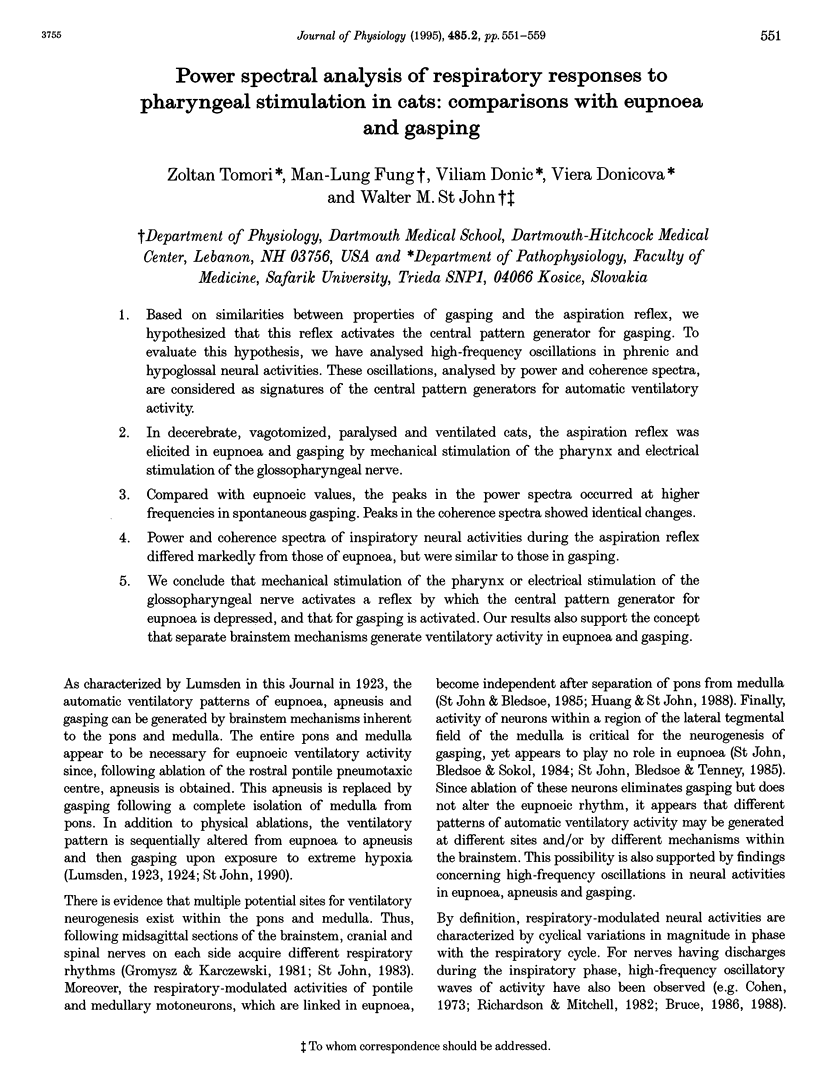
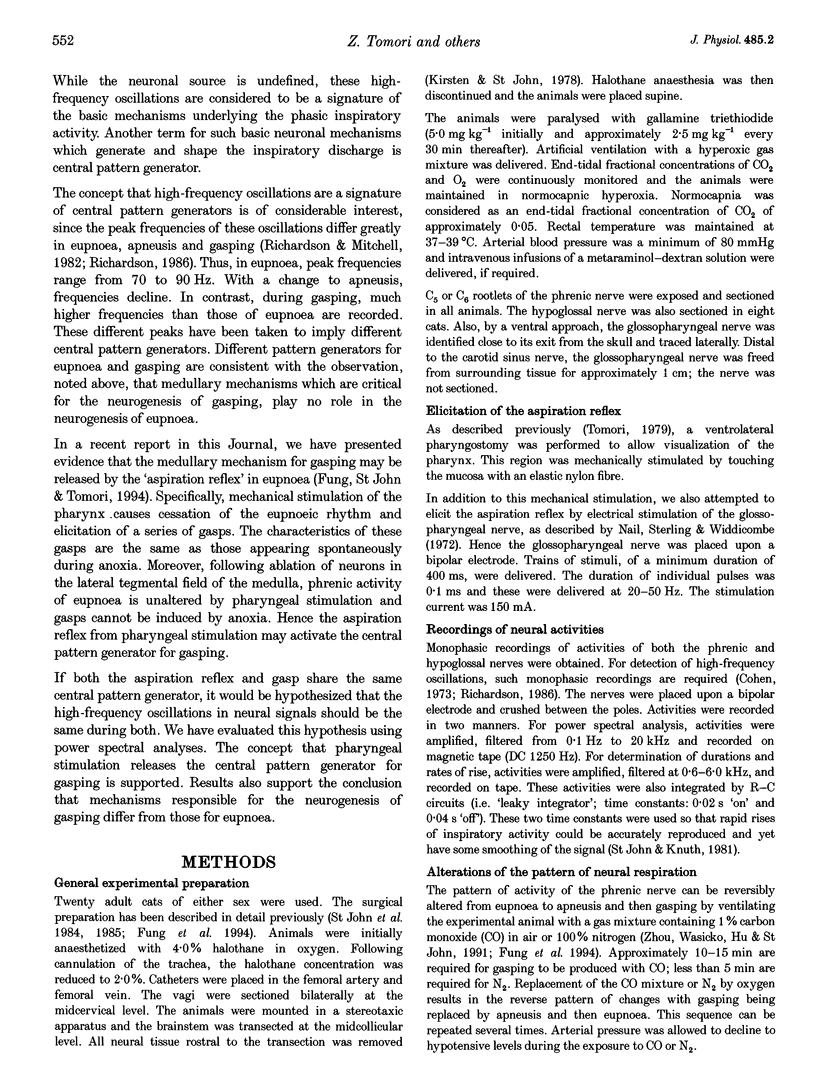
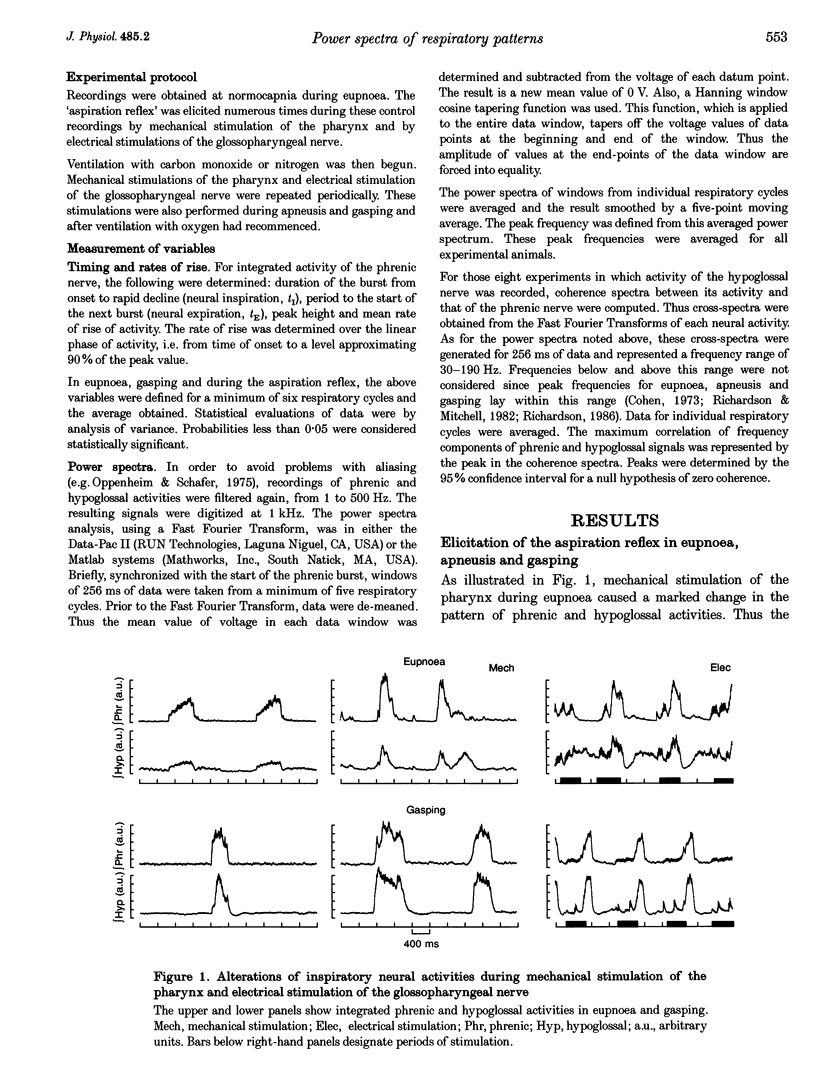
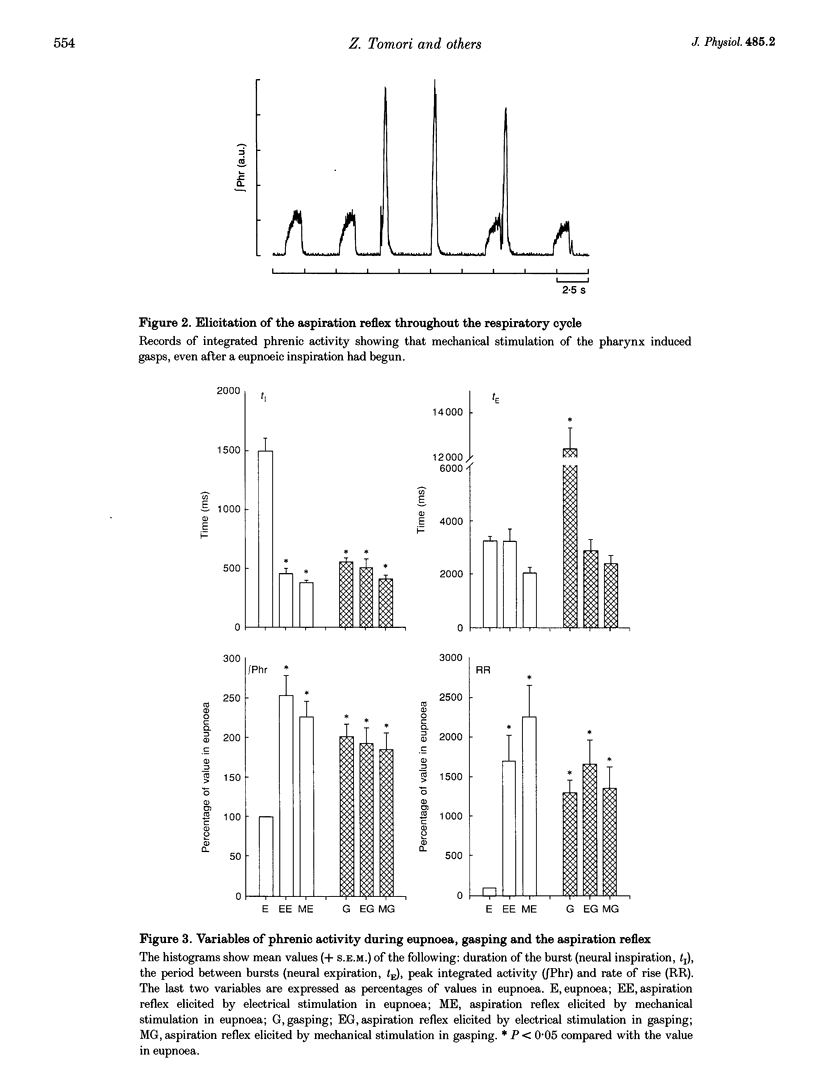
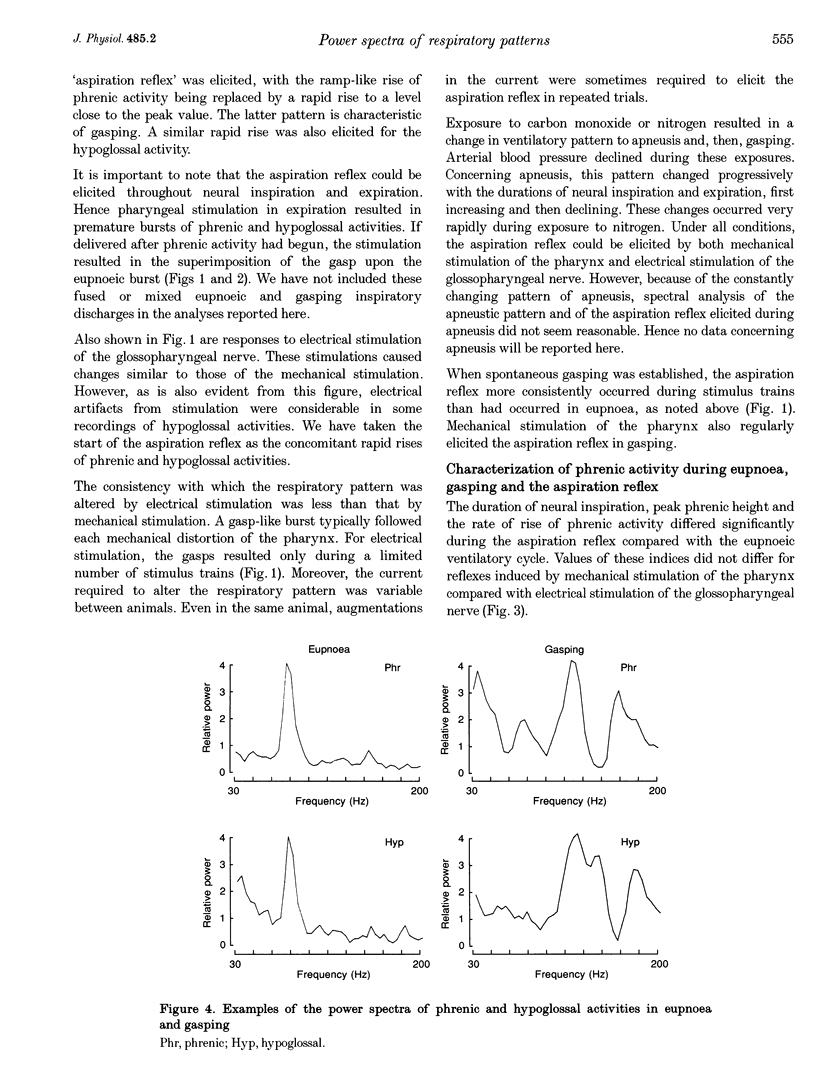
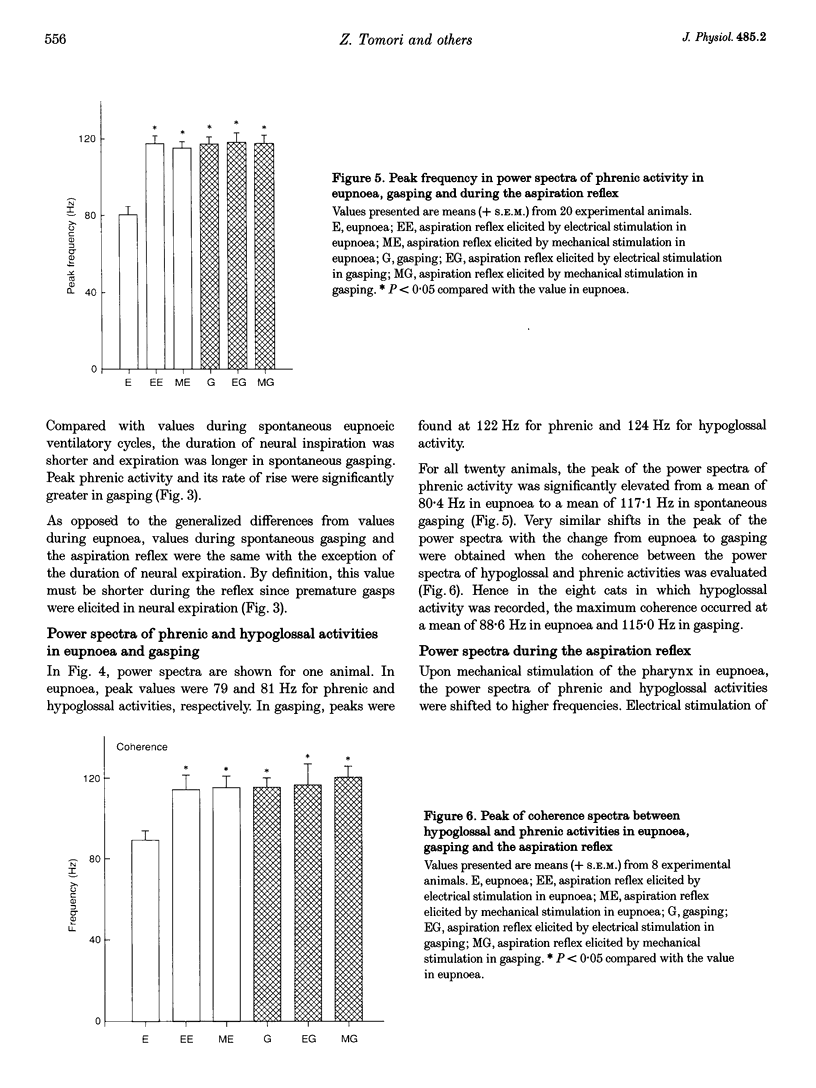
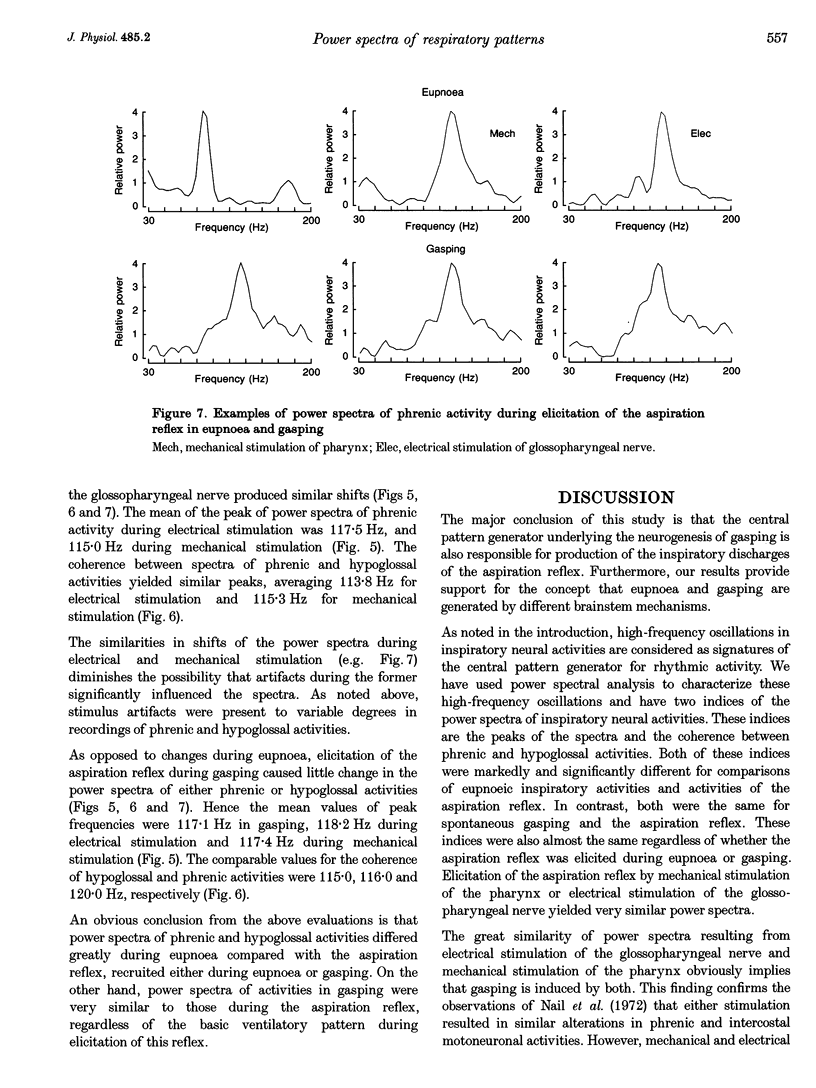
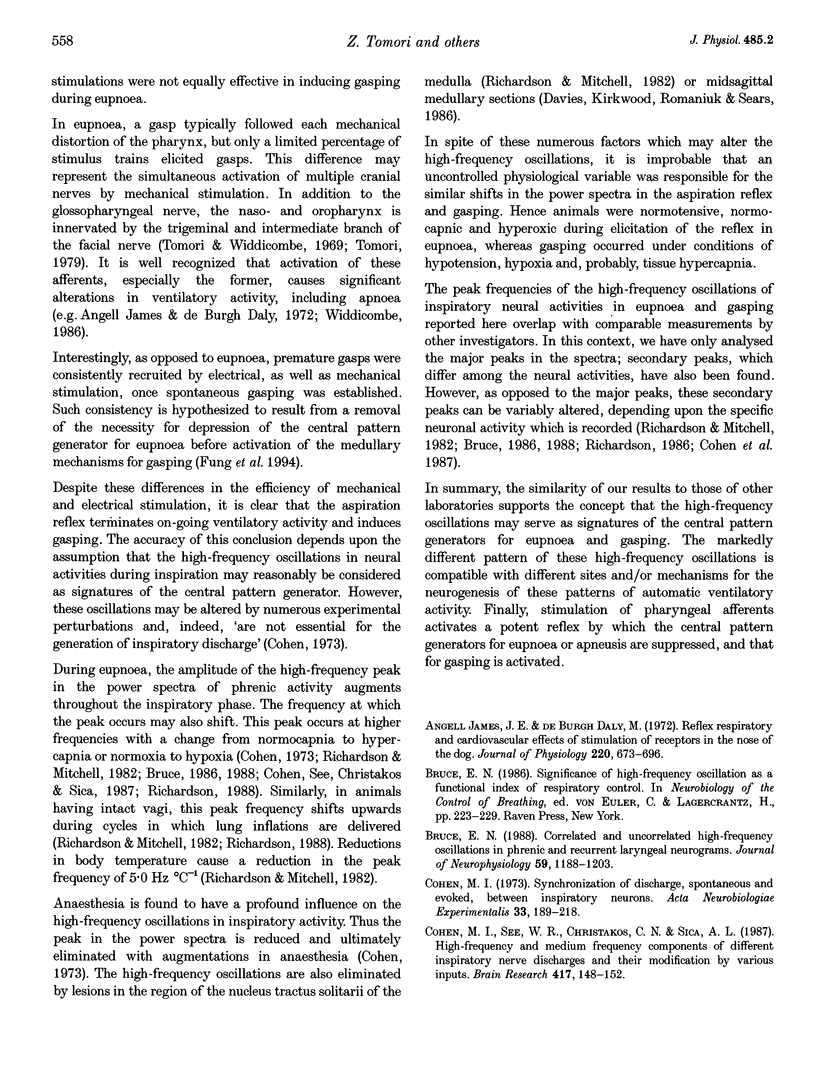
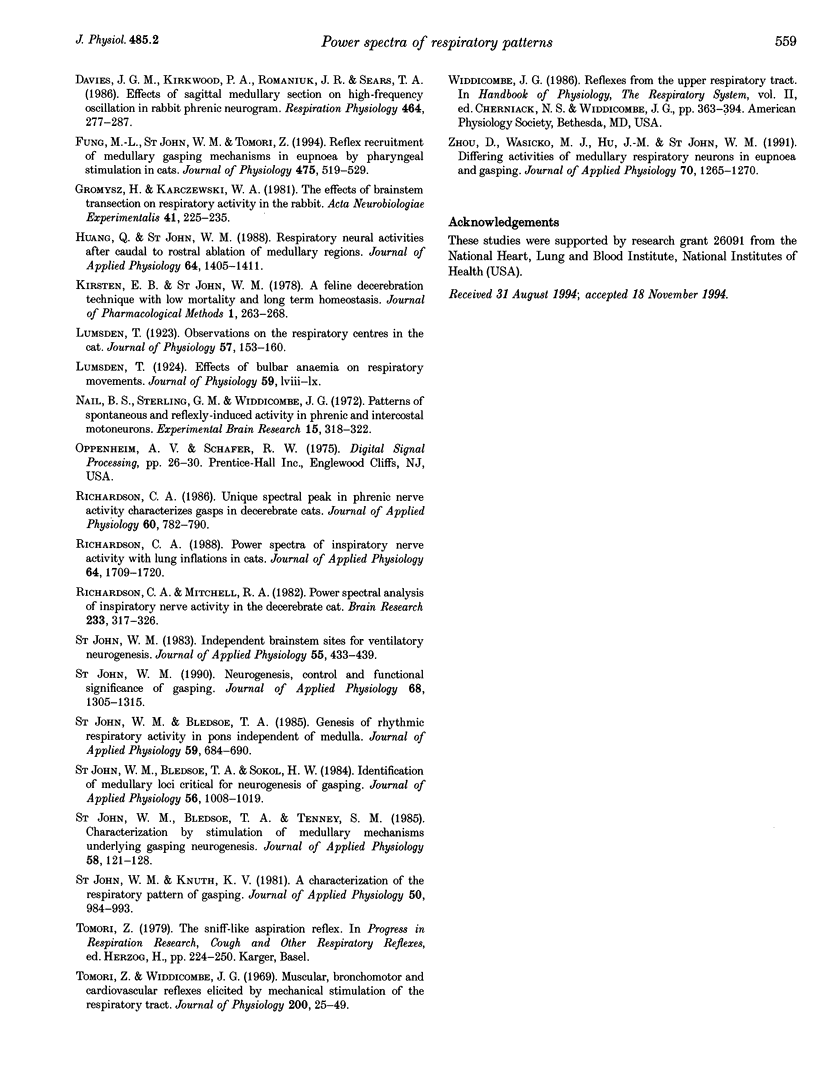
Selected References
These references are in PubMed. This may not be the complete list of references from this article.
- Bruce E. N. Correlated and uncorrelated high-frequency oscillations in phrenic and recurrent laryngeal neurograms. J Neurophysiol. 1988 Apr;59(4):1188–1203. doi: 10.1152/jn.1988.59.4.1188. [DOI] [PubMed] [Google Scholar]
- Campbell J. A. Changes in the tensions of CO(2) and O(2) in gases injected under the skin and into the abdominal cavity. J Physiol. 1924 Aug 12;59(1):1–16. doi: 10.1113/jphysiol.1924.sp002157. [DOI] [PMC free article] [PubMed] [Google Scholar]
- Cohen M. I., See W. R., Christakos C. N., Sica A. L. High-frequency and medium-frequency components of different inspiratory nerve discharges and their modification by various inputs. Brain Res. 1987 Aug 4;417(1):148–152. doi: 10.1016/0006-8993(87)90190-9. [DOI] [PubMed] [Google Scholar]
- Cohen M. I. Synchronization of discharge, spontaneous and evoked, between inspiratory neurons. Acta Neurobiol Exp (Wars) 1973;33(1):189–218. [PubMed] [Google Scholar]
- Davies J. G., Kirkwood P. A., Romaniuk J. R., Sears T. A. Effects of sagittal medullary section on high-frequency oscillation in rabbit phrenic neurogram. Respir Physiol. 1986 Jun;64(3):277–287. doi: 10.1016/0034-5687(86)90121-0. [DOI] [PubMed] [Google Scholar]
- Fung M. L., St John W. M., Tomori Z. Reflex recruitment of medullary gasping mechanisms in eupnoea by pharyngeal stimulation in cats. J Physiol. 1994 Mar 15;475(3):519–529. doi: 10.1113/jphysiol.1994.sp020090. [DOI] [PMC free article] [PubMed] [Google Scholar]
- Gromysz H., Karczewski W. A. The effects of brainstem transection on respiratory activity in the rabbit. Acta Neurobiol Exp (Wars) 1981;41(2):225–235. [PubMed] [Google Scholar]
- Huang Q., St John W. M. Respiratory neural activities after caudal-to-rostral ablation of medullary regions. J Appl Physiol (1985) 1988 Apr;64(4):1405–1411. doi: 10.1152/jappl.1988.64.4.1405. [DOI] [PubMed] [Google Scholar]
- James J. E., De Burgh Daly M. Reflex respiratory and cardiovascular effects of stimulation of receptors in the nose of the dog. J Physiol. 1972 Feb;220(3):673–696. doi: 10.1113/jphysiol.1972.sp009729. [DOI] [PMC free article] [PubMed] [Google Scholar]
- Lumsden T. Observations on the respiratory centres in the cat. J Physiol. 1923 Mar 21;57(3-4):153–160. doi: 10.1113/jphysiol.1923.sp002052. [DOI] [PMC free article] [PubMed] [Google Scholar]
- Nail B. S., Sterling G. M., Widdicombe J. G. Patterns of spontaneous and reflexly-induced activity in phrenic and intercostal motoneurons. Exp Brain Res. 1972;15(3):318–332. doi: 10.1007/BF00235915. [DOI] [PubMed] [Google Scholar]
- Richardson C. A., Mitchell R. A. Power spectral analysis of inspiratory nerve activity in the decerebrate cat. Brain Res. 1982 Feb 11;233(2):317–336. doi: 10.1016/0006-8993(82)91205-7. [DOI] [PubMed] [Google Scholar]
- Richardson C. A. Power spectra of inspiratory nerve activity with lung inflations in cats. J Appl Physiol (1985) 1988 Apr;64(4):1709–1720. doi: 10.1152/jappl.1988.64.4.1709. [DOI] [PubMed] [Google Scholar]
- Richardson C. A. Unique spectral peak in phrenic nerve activity characterizes gasps in decerebrate cats. J Appl Physiol (1985) 1986 Mar;60(3):782–790. doi: 10.1152/jappl.1986.60.3.782. [DOI] [PubMed] [Google Scholar]
- St John W. M., Bledsoe T. A. Genesis of rhythmic respiratory activity in pons independent of medulla. J Appl Physiol (1985) 1985 Sep;59(3):684–690. doi: 10.1152/jappl.1985.59.3.684. [DOI] [PubMed] [Google Scholar]
- St John W. M., Bledsoe T. A., Sokol H. W. Identification of medullary loci critical for neurogenesis of gasping. J Appl Physiol Respir Environ Exerc Physiol. 1984 Apr;56(4):1008–1019. doi: 10.1152/jappl.1984.56.4.1008. [DOI] [PubMed] [Google Scholar]
- St John W. M., Bledsoe T. A., Tenney S. M. Characterization by stimulation of medullary mechanisms underlying gasping neurogenesis. J Appl Physiol (1985) 1985 Jan;58(1):121–128. doi: 10.1152/jappl.1985.58.1.121. [DOI] [PubMed] [Google Scholar]
- St John W. M. Independent brain stem sites for ventilatory neurogenesis. J Appl Physiol Respir Environ Exerc Physiol. 1983 Aug;55(2):433–439. doi: 10.1152/jappl.1983.55.2.433. [DOI] [PubMed] [Google Scholar]
- St John W. M., Knuth K. V. A characterization of the respiratory pattern of gasping. J Appl Physiol Respir Environ Exerc Physiol. 1981 May;50(5):984–993. doi: 10.1152/jappl.1981.50.5.984. [DOI] [PubMed] [Google Scholar]
- St John W. M. Neurogenesis, control, and functional significance of gasping. J Appl Physiol (1985) 1990 Apr;68(4):1305–1315. doi: 10.1152/jappl.1990.68.4.1305. [DOI] [PubMed] [Google Scholar]
- Tomori Z., Widdicombe J. G. Muscular, bronchomotor and cardiovascular reflexes elicited by mechanical stimulation of the respiratory tract. J Physiol. 1969 Jan;200(1):25–49. doi: 10.1113/jphysiol.1969.sp008680. [DOI] [PMC free article] [PubMed] [Google Scholar]
- Zhou D., Wasicko M. J., Hu J. M., St John W. M. Differing activities of medullary respiratory neurons in eupnea and gasping. J Appl Physiol (1985) 1991 Mar;70(3):1265–1270. doi: 10.1152/jappl.1991.70.3.1265. [DOI] [PubMed] [Google Scholar]


